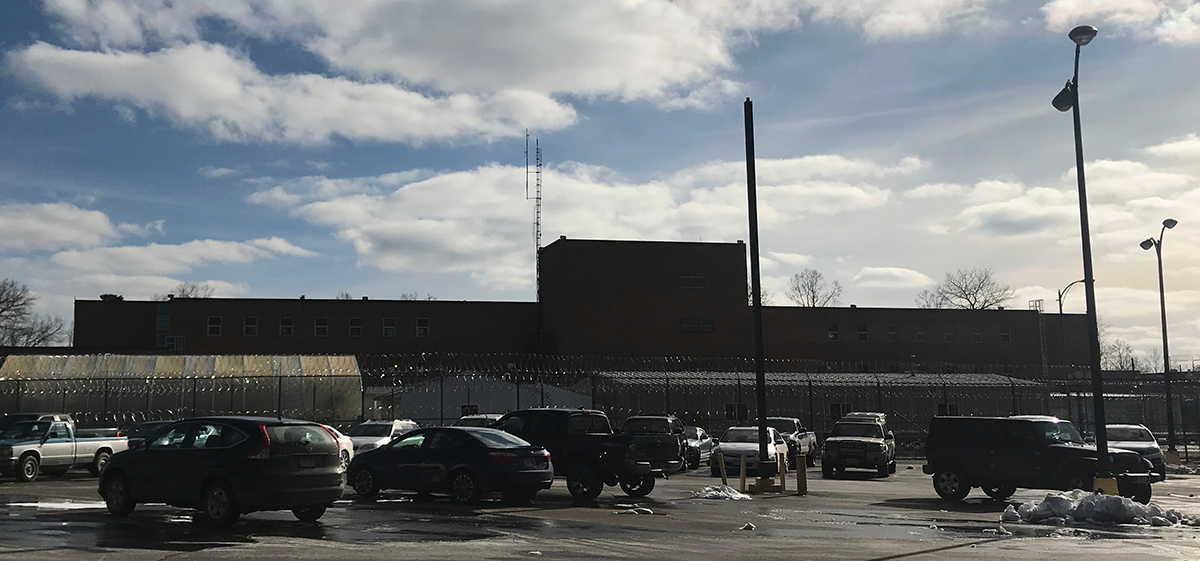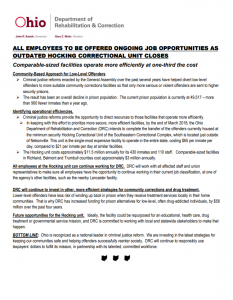
Hocking Correctional Looks for New Life After Sudden Closure
By: Alexander Moore, Micaela MarshallBy: Matt Lackritz
Posted on:
Hocking Correctional has been part of Nelsonville for more than 30 years. Then all of the sudden the Ohio Corrections Department decided to shut down the prison at the beginning of this year. It’s closure was unexpected to many community members and leaders.

Fullbrooks Cafe is in the heart of downtown Nelsonville. Dan Jones, co-owner of the cafe, is worried about what will happen once the prison shuts down, since many of the workers have become regular customers.
“We were getting used to seeing that uniform come through the door. There was a lot of really nice people that you know, we’re not gonna have in the cafe anymore,” said Jones.
History and Initial Reaction
Hocking Correctional is part of the Southeastern Correctional Complex and has operated as a prison since 1982. Three days into the new year word came from the state that it’s closing due to inefficiency.

According to the initial announcement from the Department of Rehabilitation and Corrections (DRC), “This unit is the single-most expensive facility to operate in the entire state, costing 65 dollars a day for each inmate, compared to 21 dollars at similar facilities.”
The announcement goes on to say “The Hocking unit costs approximately $11.5 million annually for its 430 inmates and 110 staff. Comparable-sized facilities in Richland, Belmont and Trumbull counties cost approximately $3 million annually.”
State representative Jay Edwards was furious about the lack of community input on the decision to close. Edwards sent a letter to Corrections Director Gary Mohr to make sure he understood what issues the community would face once the prison shut down.
“I was upset with the prison closing, I was upset with Director Mohr, Director Mohr was upset me and I probably upset him with my statements that I made after that. But there’s no point, we’re two grown adults, and there’s no point to holding to that, and we need to move forward to make this a win for the region,” said Edwards.
Nelsonville City Council President Ed Mash, who worked at the prison for more than 30 years before his role on city council, was also upset.
“Initially it angered me at first, I thought wow, because it’s devastating to the area and me being on city council, I knew the effect that it would have on our community, not just our community but on our region,” said Mash.
First Meeting

Congressman Steve Stivers held a closed meeting on January 25th at the Lodge at Hocking College. His initial intent was to hold a small discussion with key leaders on future possibilities for the building once the prison closes. However, the meeting had more than 80 people in attendance with representatives from the DRC, state and local officials as well as local community leaders. All of those invited shared ideas for the future of the facility, but it was not open to the public.
“I know that the prison closure is still a very emotional issue for a lot of people, but everybody handled this in a very thoughtful way and was forward-looking which was the point of the meeting,” said Congressman Stivers.
Stivers’ main reason for calling this meeting was not to discuss the closure of the prison, but to learn about the region’s core issues to see if federal money could help.
“How do we leverage this potential open facility to serve the needs of the broader region and how can I as a federal official bring federal dollars in to do that,” said Stivers.
What this means for Nelsonville

Nelsonville leaders are really worried about how they are going to make up for the $360,000 annually the prison paid for water and sewer services.
“As far as for the city of Nelsonville our number one concern right now needs to be what can we get in that facility to get a water bill. Because if it’s $30,000 a month that the city is missing out on, then we need to figure out a solution pretty quick and we are working actively on that,” said Edwards.
Nelsonville City Council passed a resolution January 22nd asking the state to reconsider the decision to close the prison. If the state refuses to reconsider, then city council asks the state to grant Nelsonville a $360,000 impact fee for the next three years to help the city survive.
“To me, I feel they have an obligation to pay us that money, the obligation is you can’t go into a community and shut something down and destroy it. That’s what happened. You have to give people time,” said Mash.

Nelsonville also wants ownership of the building when the prison closes, but Representative Edwards isn’t convinced that is a realistic goal.
“I don’t think the financial situation would allow for the city to have that asset on their books,” said Edwards.
All these requests are to help stop a potential fiscal emergency in Nelsonville.
“I hate to say it, we’re faced with some staffing changes and changing our entire way of operating. We’re going to be a bare-bones minimum that’ll operate and support this city,” said Mash.
At first community leaders were pushing for the state to reconsider the decision to close, but now they understand that isn’t going to happen. While they’ve made requests for the impact fee and ownership of the building, local leaders also realize that might not happen either.
The Future of Hocking Correctional
The focus now is what this facility could become to help solve some of the region’s core issues. Poverty, lack of broadband access, jobs and the need for more county and regional jail cells were all discussed at the initial community meeting. However, the issue that kept coming up again and again was the opioid epidemic in southeastern Ohio and the need for a regional treatment center.

Hocking Municipal Court Judge Fred Moses, attended the meeting held by Stivers and spoke about the opioid epidemic taking over the region. Moses helped create a program to combat the opioid crisis. He holds a weekly check-in session to make sure people in the drug court program are staying clean, completing their community service hours, and finding jobs.
“I just started keeping a running total of what people were on. What I found was between 68-75% coming through my court were on some type of opioid,” said Moses.
Moses has one of the most successful drug courts in Ohio and while the prison closing may be hard for the community initially, he hopes that the closing will lead to other opportunities. When asked what it would mean to the community if the vacant facility did become an opioid treatment center, Moses said that it could help the people of Appalachia.
“I would love to see something like that. I don’t know how that looks and that’s the hard part I think for everybody. Everybody involved in this, the DRC has basically said, here it is figure out what to do with it, we’ll pick something out of it,” said Moses.
The DRC welcomes community input in the form of a proposal and is offering tours of the facility. The proposals are due March 30th.
Nelsonville City Council and Judge Moses plan to coordinate with others to submit proposals.
The DRC promised that “all 110 employees will be offered ongoing job opportunities.” It isn’t clear right now where they will all end up; it could be at any DRC prison in the state. Most employees will likely be moved to the Lancaster branch of the Southeastern Correctional Complex. The job transfers will be finalized by March 18th.
By February 22nd all inmates at Hocking Correctional were moved out of the building.
Hope for Nelsonville
While Dan Jones from Fullbrooks Cafe may be losing some of his loyal customers, he knows this isn’t the end for Nelsonville.
“People thought the town was going to die when the coal was gone and then when the clay was gone. And then when the boot factory closed and when the bypass happened. Nelsonville has always persevered,” said Jones.
What the facility will become, who will own it, and what happens next is all up in the air. The only certainty right now is that the prison will be shut down March 30. Community leaders hope it’s the beginning of a brighter future, not the end of Nelsonville.
“It’s just a cycle of two steps forward one step back. It’s hard to absorb these blows sometimes but hopefully everyone makes it work with their life and the city government can make something happen positively,” said Jones.

